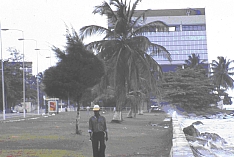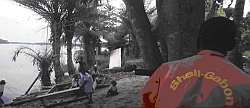The Crimes of Bongo Part V

Apartheid & Terror in Africa's Gardens of Eden
By Keith Harmon Snow
Keith Harmon Snow is the 2009 Regent's Lecturer in Law & Society at the University of California Santa Barbara, recognized for over a decade of work, outside of academia, contesting official narratives on war crimes, crimes against humanity and genocide while also working as a genocide investigator for the United Nations and other bodies. He is also a past and present (2009) Project Censored award winner.
...Continued from last week
THE KING OF BLING
Bongo was connected to the Corsican mafia through the French ministers and shady businessmen, including Michel Tomi and son Jean-Baptiste, and Robert Feliciaggi (assassinated in a professional hit in Corsica, March 10, 2006), his son Jean-Jerome and brother Charles. Alleged to run French money-laundering schemes through casinos, lotteries and betting shops in Togo, Benin, Cameroon, Cote d’Ivoire, Congo-Brazzaville and Gabon, Jean-Jerome is close to Sassou-Nguesso, and Charles’ business supplies the Presidential Guard of diamond and petroleum magnate Jose Eduardo Dos Santos in Angola; the brothers held the second biggest bank accounts —after Elf-Aquitaine—at France’s now defunct FIBA bank, the conduit for Gabon and Angola’s plundered oil wealth.82
Gabon’s wealth was also siphoned off through the BGFI Bank,
Jean Ping is one of the most powerful members of Bongo’s clan des Gabonaise, and an unapologetic agent for western capitalism’s enterprise of plunder and depopulation in Africa.
Corsican Michel Tomi operates through Groupe Kabi in
Omar Bongo, Charles Pasqua, Jean-Christophe Mitterand and other officials were involved in Angolagate, the French arms-for-oil scandal involving shady arms merchants, oil executives, intelligence operatives and others in France and
 |
|
The elite ELF-Gabon headquarters along the ocean in Libreville. Photo: keith harmon snow, Libreville, Gabon, 1997. |
Through the Pentagon’s Gulf of Guinea Initiative,
THE CALCULATED IMPOSITION OF IGNORANCE
Gamba town is the urban centre of the wild Gamba Protected Area Complex, an enclave of white, gated western privilege surrounded by dense forests, impenetrable swamps and deep estuaries where you might see an elephant swimming across open water or ambling across a grassy field. This is Shell country in Gabon, and the only way in is on an expensive Air
“If I have to describe Gamba to someone,” confided one French expatriate in “Shell’s Best Kept Secret,” a blurb in a Royal/Dutch Shell public relations brochure, “I always say it is a Club-Med in the middle of the jungle. You have the freedom and opportunity to do things you thought you’d only ever dream of and all with an amazing backdrop of jungle and unspoilt beaches and lots of wildlife right on your doorstep! … We are quite a sporty bunch in Gamba. We have our own 18 hole golf course, there is the Yenzi Boat club a sailing club, tennis, football, tae-kwon-do, yoga, fitness, swimming, aerobics & step classes, volleyball, badminton, squash, hockey, rugby and much, much more...not to mention that every so often you can take part in our triathlon!” 93
In October 2004, paramilitary police in Gamba killed two locals who protested against Shell’s injustices. A survey of local attitudes revealed a climate of fear seething beneath the surface. Locals reported routine oil spills where Shell and contractors Halliburton and Schlumberger have for years and years burned off oil spills as a form of remediation. 94
With a certain arrogance that comes with white society beliefs about entitlement, French expatriates have considered Gabon their private property since the colonial era, and Gamba is one of their hideaway playgrounds.95 One French expatriate in Gamba, Louis Rigon, runs a high-end sport fishing and ‘ecotourism’ business, with private luxury camps and powerboats in the bush. 96 He also provides a logistic base for oil exploration when companies like Transworld Exploration Gabon—a Houston
 |
|
Royal/Dutch Shell controls the Rabi oil fields of the Gamba Complex but local Gabonese who live in and around the concessions have received zero benefits from decades of oil exploitation and export.Photo: keith harmon snow, Sette Cama, Gabon, December 2004. |
Southern Era began prospecting in
Tracking elephants in the Loango reserve turned up the remains of a research camp in the savannah. My local guide and WWF-paid ranger Robert (not his real name) took me to the place where the Smithsonian Institute set up a massive animal and plant collection operation; teams of researchers descended on the Loango wilderness and began catching, counting, cataloging, categorizing, and collecting species and genetic material. Claiming a universal benefit to all humanity—and to the people of Gabon, of course—the Smithsonian’s Gabon Biodiversity Monitoring and Research Program involves U.S. universities and scores of western researchers and tens of millions of dollars in funds; it is also backed by Shell Oil Corporation.98 These funds cycle to and from western economies bringing little benefit to Gabonese people like Robert, and nothing of benefit to the average Gabonese citizen. Smithsonian scientists reported that they have ‘recorded’ over 2019 species of trees and thousands of species of birds, reptiles, snakes and amphibians, but they didn’t merely ‘record’ these species, they collected them.99 “Voucher specimens were injected with formaline (5%), then preserved in 70% ethanol, and will be housed in several scientific institutions.” 100
“They paid us 6000 CFA (US $12) per day to collect birds, snakes, lizards,” says Robert, “They killed them and packed them up in jars and boxes. We worked hard, setting traps and checking nets, all day and night sometimes. It wasn’t much money.”
Robert was hired because he knew how to catch birds, where to hang nets, where bat species might be found, the habitat of rare snakes—you know, simple stuff, like where a rodent will hide—but based on years of painstaking study and intimate knowledge of the local environment for which Robert has dedicated his heart and soul all his life. Robert didn’t know anything about genetic engineering, cloning, or intellectual property rights, and that’s why it was easy for the Smithsonian to come in to Gabon and steal Robert’s intellectual property and pay him approximately one dollar and fifteen cents (sic) an hour.
Biodiversity in the Gamba Complex Protected Area is of value to corporations for pharmaceutical products, unethical genetic engineering, and huge inequitable, white economy ‘research’ programs predicated on Empire and support for the military-industrial complex, but operating both obliviously and knowingly under false presumptions, innocence, humanitarianism, science and progress.
 |
|
Biodiversity in the Gamba Complex Protected Area is of value to corporations for pharmaceutical products, unethical genetic engineering, and huge inequitable, white economy 'research' programs predicated on Empire and support for the military-industrial complex, but operating both obliviously and knowingly under false presumptions, innocence, humanitarianism, science and progress. Photo: keith harmon snow, Loango National Park, gabon, December 2004. |
“Under Bongo life is hard,” Robert told me. “Many people are malnourished, many people are poor. There is no work. It’s terrible.”
The Smithsonian proceeded with the support of President Omar Bongo, the Pentagon, U.S. State Department, U.S. Fish & Wildlife Service, NASA and other predatory agencies. Massive physical, economic and intellectual (property) thefts are underway, and it occurs on the backs of eager, willing, hopeful, yet unfreedomed Africans. 101
To be continued
Footnotes
82 “France/Africa: Professional Risks,” Africa Confidential, Vol. 47. No. 6, March 3, 2006.
83 See: http://www.ag-partners.com/en/news-detail.php?id_art=63.
84 Frente para a Libertação do Enclave de Cabinda, FLEC.
85 “President Bongo Loses Court Case Against Ex-Official at Oil Group Elf,” African Oil Journal, December 26, 2007, http://www.africanoiljournal.com/12-26-2007_president_bongo.htm; and Toby Shelley, Oil: Politics, Poverty & the Planet, Zed Books, 2005.
86 Sophie Coignard & Marie-Théres Guichard, French Connections: Networks of Influence, Algora, 2000.
87 “France/Africa: Professional Risks,” Africa Confidential, Vol 47. No. 6, March 3, 2006.
88 Ken Silverstein, “Good Press for Dictators,” The American Prospect, April 8, 2001.
89 “They Came to Bury Him Not to Praise Him,” The Economist, June 18, 2009; http://www.economist.com/world/europe/displaystory.cfm?story_id=13875618&fsrc=rss
90 Historical Facts
91 Wayne Madsen, Genocide and Covert Operations in Africa, 1993-1999, Mellon Books, 1999, p. 251-253.
92 Wayne Madsen, “AFRICOM: The Recolonization of Africa by Uncle Sam,” Wayne Madsen Report, January 3, 2008; see also Madsen, Genocide and Covert Operations in Africa, 1993-1999, Mellon Books, 1999, p. 251-253.
93 Jet Hoeve and Sue Garrone, “Shell’s Best Kept Secret,” Destinations, a Royal/Dutch Shell public relations expatriate magazine, Issue 39, Vol. 11, No. 2, June 2006, p. 8: http://www.outpostthehague.com/destinprotect/pdfissues/destinations39/Destinations_39_01.pdf; see also Yenzi Boat Club, www.yenziboatclub.com .
94 Private interviews, Gamba Complex, December 2004.
95 See: “Les Anciens de Gamba,” http://www.gamba-gabon.com/#/adresses/3096600.
96 Rigon also operates in Madagascar and
97 keith harmon snow, Merchant’s of Death: Exposing Corporate Financed Holocaust in Africa, September 2008,; see also: http://www.southernera.com/ and http://www.mwanaafrica.com/ .
98 See: http://nationalzoo.si.edu/ConservationAndScience/MAB/documents/GabonBriefingPaper6.pdf . See also: Shell’s slick corporate website: www.shellfoundation.org .
99
100
101 Nobel economist Amartya Sen describes “unfreedoms” in his book Development as Freedom (Sen, 1999).
